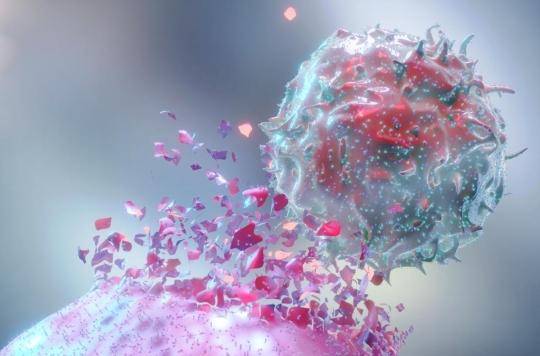A personalized vaccine specific to each patient, designed from samples of the patient’s tumor to increase its effectiveness, has given promising initial results. Clinical trials will continue.

- The vaccine candidate was well tolerated by patients and the first data on its efficacy are promising.
- It consists of boosting the immune system by mixing peptides, small proteins present in the tumor which allow its growth, and an adjuvant.
- Five other phase I clinical trials are planned.
Vaccine research is on the rise. After those developed against Covid-19 or the vaccine currently being researched against HIV, it is the turn of cancers to be the target. American doctors from Mount Sinai in New York have developed a new approach in the treatment of cancer using a personalized product, designed from samples of the patient’s tumor to increase its effectiveness. The results of a phase I clinical trial were presented at the annual conference of theAmerican Association for Cancer Research which is held until April 15, 2021.
A specific protocol
This is only the beginning of the research but it is showing promise. Scientists started working on the design of a cancer vaccine since 2018. At that time, they developed a protocol identification and purification of cancerous peptides, small proteins present in the tumor which allow its growth. To find the peptides most likely to elicit an effective immune response against the tumor, the researchers pooled several samples of the tumor to isolate DNA and RNA from them before sequencing them.
Thanks to bioinformatics, the 15 most interesting peptides are isolated. From this selection, the researchers will create the vaccine in the laboratory by adding an adjuvant, Poly-ICLC. This is'”a synthetic and stabilized double-stranded RNA capable of activating several innate immunity receptors, making it the optimal adjuvant to induce an immune response against tumor antigens”, describes Nina Bhardwaj, head of the immunotherapy program at the Mount Sinai Clinic and responsible for the clinical trial.
Good tolerance
The phase I clinical trial was conducted on 13 patients with different types of cancer, with a significant risk of relapse, in order to test the tolerance of the vaccine. In addition to their usual treatments to cure their cancer, the participants received ten doses of the vaccine, spread over six months. They were then followed for two and a half years and the results are encouraging. The main objective of the trial is fulfilled since the vaccine was well tolerated by the patients. A third experienced symptoms but they were minor and only localized at the injection site.
Regarding the effects of this vaccine, although it is still too early to draw conclusions, the results are promising. Eight volunteers did not relapse. Four others unfortunately died of their illness and one patient did not wish to continue the trial. In one of the participants, an immune reaction specific to the vaccine was observed while in two other cases, the vaccine contributed to improving the effectiveness of a treatment by immunotherapy. Five other phase I clinical trials are planned and the researchers are going to conduct them on patients with other cancers such as the bladder or the prostate.
.















